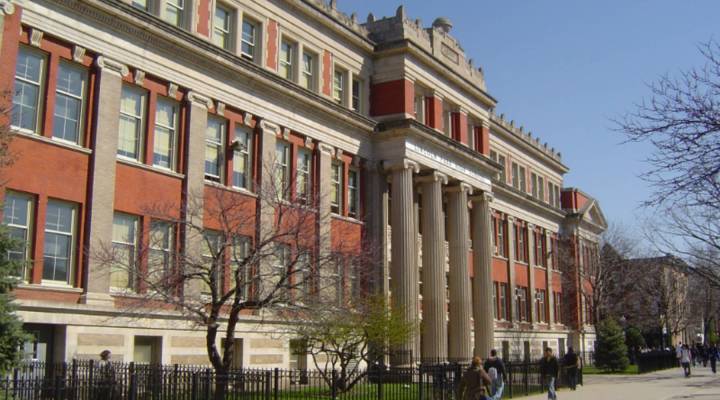
Chicago teachers stage one-day walkout

As teachers in the nation’s third-largest school district stage a one-day strike to draw attention to the financial troubles in Chicago’s public school system, a former chief of Chicago Public Schools offered a grim assessment.
“Effectively, the district is bankrupt,” said Terry Mazany, who was an interim chief at Chicago Public Schools from 2010 to 2011. Mazany is currently the CEO of The Chicago Community Trust, a philanthropic foundation.
Chicago Public Schools’ finances are in bad shape. The district’s credit rating has been slashed to junk status, and it is almost $7 billion in debt — including debt it took out recently at high interest rates, just to stay afloat.
“These challenges are decades in the making,” Mazany said, “Chicago Public Schools have a growing liability of pensions, health care costs, and aging facilities.” He said CPS’s challenges are similar to many other large urban districts, but Chicago’s school district is unique in that it also is stuck with huge unfunded pension liabilities.
For years, the district did not make required pension contributions. As of 2015, it owed $9.6 billion to the teachers’ pension fund. State law requires that pensions be funded at 90 percent. The Chicago teachers’ pension is currently funded at 52 percent, because of the district’s “pension holidays,” which first began in 1995.
Currently, CPS owes the teachers’ pension system $679 million in this year’s payments.
Chicago’s teachers want the one day walk-out to highlight their demand that state government contribute more to CPS’s budget. The state’s funding formulas provide less money to Chicago’s schools, compared to districts in other areas of the state.
But actions to provide more money to Chicago schools have proved elusive. The Illinois state government has been stuck in a political stalemate between a newly elected Republican governor and a Democrat-controlled state legislature, which disagrees with his policy proposals.
Governor Bruce Rauner has said he is willing to consider changes to funding formulas, but opposes simply sending money to aid in CPS’s financial woes.
“Frankly, the legislature, the super majority in the legislature, along with the mayor in Chicago, decided together to skip pension payments for a number of years… And now they’re saying, ‘Crisis, crisis! We skipped our pension payments, somebody else has got to bail us out,'” Rauner said at a press conference earlier this week. “Let’s be clear: that’s not right.”
Rauner has proposed that the Chicago Public Schools be allowed to go into bankruptcy reorganization, and into state receivership. Chicago Mayor Rahm Emanuel, who was not in office when pension holidays were first implemented at CPS, opposes that idea, as does the Chicago Teachers Union.
Still, while the mayor was supportive of the teachers’ reasons for the one-day strike, he was critical of the strike itself. “I appreciate and stand with teachers in opposition to what our state’s doing. I ask you not to take it out on our children and their education,” Emanuel said.
There’s a lot happening in the world. Through it all, Marketplace is here for you.
You rely on Marketplace to break down the world’s events and tell you how it affects you in a fact-based, approachable way. We rely on your financial support to keep making that possible.
Your donation today powers the independent journalism that you rely on. For just $5/month, you can help sustain Marketplace so we can keep reporting on the things that matter to you.












